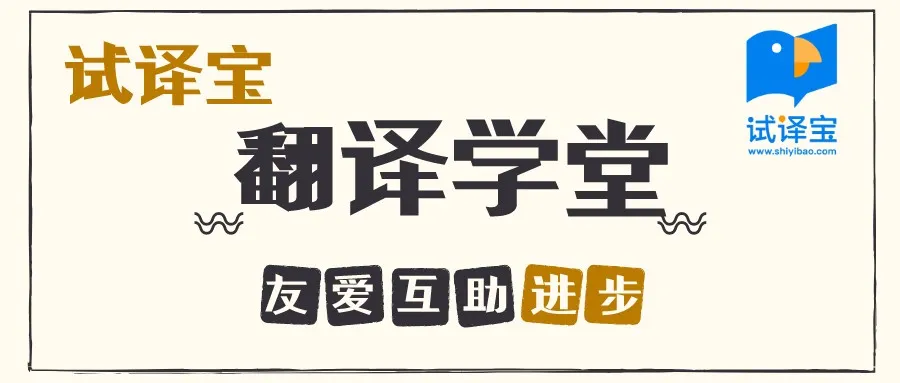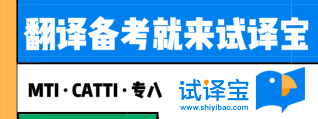
翻译小学堂:原文+参考译文(逐段解析)
形式:先思考,再对比,分析总结,内化吸收
苏州大学MTI英译汉真题【阅读】
Starting a new book is a risk, just like falling in love. You have to commit to it. You open the pages knowing a little bit about it maybe, from the back or from a blurb on the front. But who knows, right? Those bits and pieces aren’t always right.
Sometimes people advertise themselves as one thing and then when you get deep into it you realize that they’re something completely different. Either there was some good marketing attached to a terrible book, or the story was only explained in a superficial way and once you reach the middle of the book, you realize there’s so much more to this book than anyone could have ever told you.
You start off slow. The story is beginning to unfold. You’re unsure. It’s a big commitment lugging this tome around. Maybe this book won’t be that great but you’ll feel guilty about putting it down. May be it’ll be so awful you’ll keep hate-reading or just set it down immediately and never pick it up again.
Maybe you’re worn out. Maybe you’ve taken some time off from reading because the last few books you read just weren’t worth it. Do they even write new, great works of literature anymore?
Maybe that time you fell in love with a book before will just never happen for you again. Maybe it’s a once in a lifetime feeling and you’re never gonna find it again.
Or something exciting could happen. Maybe this will become your new favorite book. That’s always a possibility, right? That’s the beauty of risk. The reward could actually be worth it.
参考译文(逐段解析)
【句段1】
Starting a new book is a risk, just like falling in love. You have to commit to it. You open the pages knowing a little bit about it maybe, from the back or from a blurb on the front. But who knows, right? Those bits and pieces aren’t always right.
参考译文:
开始阅读一本新书恰似坠入爱河,是场冒险。你得全身心投入进去。翻开书页之时,从封底或从封面的简介中,你或许会对它有些许的了解。但谁也说不准,对吧?那些零碎的片断并不总是正确的。
重点词汇:
risk危险,冒险
commit to交付,把…投入
blurb(书、新产品等的)简介
front封面
bits and pieces零碎
翻译要点:
1. “Starting a new book”,开始一本新书,这里增译谓语动词“阅读”,更符合中文语言习惯。
2. “just like”,“就像”,也可译为“正如”、“宛若”或“恰似”。
3. “knowing a little bit about it maybe, from the back or from a blurb on the front.”直译的话不符合中文习惯,因此翻译时调整语序,将“from the back or from a blurb on the front”提前,“翻开书页之时,从封底或从封面的简介中,你或许会对它有些许的了解”。
断句:
Starting a new book is a risk,/ just like falling in love. /You have to commit to it. /You open the pages /knowing a little bit about it maybe, /from the back or from a blurb on the front. /But who knows, right? /Those bits and pieces aren’t always right.
【句段2】
Sometimes people advertise themselves as one thing and then when you get deep into it you realize that they’re something completely different. Either there was some good marketing attached to a terrible book, or the story was only explained in a superficial way and once you reach the middle of the book, you realize there’s so much more to this book than anyone could have ever told you.
参考译文:
有时人们自我推销时是一种形象,等你深入了解后,你会发现他们又完全是另一种模样了。要么是拙作获得了某种出色的市场推销,要么是故事的叙述流于表面。阅读过半后,你方才发觉: 这本书其实远不止于此,而这只有依靠自己才能感悟。
词汇:
advertise做广告、作宣传
realize意识到
marketing市场营销
attached to附着,附属于
Superficial表面的,肤浅的
翻译要点:
1. “Sometimes people advertise themselves as one thing”,这里的“one thing”直译是“一样东西/一件事情”,回看句子主语是“people”,说的是人们将自己推销为“one thing”,因此翻译为“一种形象”就比较恰当;they’re something completely different里的“something”也是形容人,因此译为“模样”。
2. when引导时间状语从句,本意是“当”,在实际的翻译过程中则要经常做灵活处理,比如这里译为“当你深入了解后”就不如“等你深入了解后”更符合句意。
3. “there was some good marketing”在这里some可理解为“某种程度上”。
4. “there’s so much more to this book than anyone could have ever told you”本句较长,先做断句处理,there’s so much more to this book /than anyone could have ever told you,这本书不止于此/超过任何人能告诉你的。然后调整译文,可以译为“这本书远胜于他人能向你所述之内容”;或者,“超过任何人能告诉你的”,结合前半句“once you reach the middle of the book, you realize”,暗含的意思是“只有你自己才能感悟”,所以也可译为“这本书其实远不止于此,而这只有依靠自己才能感悟。”
断句:
Sometimes people advertise themselves/ as one thing /and then when you get deep into it /you realize that /they’re something completely different. /Either there was some good marketing/ attached to a terrible book, /or the story was only explained/ in a superficial way /and once you reach the middle of the book,/you realize/ there’s so much more to this book/ than anyone could have ever told you.
【句段3】
You start off slow. The story is beginning to unfold. You’re unsure. It’s a big commitment lugging this tome around. Maybe this book won’t be that great but you’ll feel guilty about putting it down. May be it’ll be so awful you’ll keep hate-reading or just set it down immediately and never pick it up again.
参考译文:
开始时你读得很慢,故事开始展开,而你心存犹疑。阅读这样的巨著是一项艰巨的任务。或许它并不如你想象中的那么精彩,可半途弃读会使你觉得内疚。又或许,故事真的很烂,你要么咬牙苦读下去,要么立刻放弃,束之髙阁。
词汇:
start off出发,开始
unfold展开
commitment承诺,保证
lug用力拉或拖
tome大部头巨著
awful可怕的,极坏的
翻译要点:
1. “You’re unsure”,“你不确定”,其实就是一开始对书中内容存在疑惑,因为译为“心存犹疑”。
2. “It’s a big commitment lugging this tome around”,直译“拉着这个巨著到处走是一个很大的承诺”,意思是“阅读这样的巨著是一项艰巨的任务”,commitment在这里不能翻译为原意“承诺”,它表示的是要“要为此付出巨大的努力”,因而改译为“一项艰巨的任务”。
3. “hate-reading”,一边恨着,一边读着,与汉语的“苦读”含义刚好对应。
4. “ pick up”,“捡起,拾起”,“never pick it up again”,再也不拿起来,译为成语“束之高阁”(比喻放着不用、丢在一旁不管)既传达了原意,也提高了译文的文采。
断句:
You start off slow./ The story is beginning to unfold./ You’re unsure./ It’s a big commitment/ lugging this tome around. /Maybe this book won’t be that great /but you’ll feel guilty about putting it down. /May be it’ll be so awful /you’ll keep hate-reading /or just set it down immediately/ and never pick it up again.
【句段4】
Maybe you’re worn out. Maybe you’ve taken some time off from reading because the last few books you read just weren’t worth it. Do they even write new, great works of literature anymore?
参考译文:
或许你已疲惫至极。或许因为上次读的几本书让你觉得不值得一读,你已暂时不再阅读。人们还能再创作出优秀的文学作品吗?
词汇:
worn out疲惫不堪的
worth值得的
literature文学
翻译要点:
1. take some time off,休息一段时间,“taken some time off from reading”表示“从读书这件事上休息一段时间”,也就是“暂时不再阅读”。
2. “the last few books”,不是“最后的几本书”,last此处为“最近的,上一次的”,因此译为“上次读的几本书”。
断句:
Maybe you’re worn out. /Maybe you’ve taken some time off from reading /because the last few books you read/ just weren’t worth it. /Do they even write new, great works of literature anymore?
参考译文:
或许你已疲惫至极。或许因为上次读的几本书让你觉得不值得一读,你已暂时不再阅读。人们还能再创作出优秀的文学作品吗?
【句段5】
Maybe that time you fell in love with a book before will just never happen for you again. Maybe it’s a once in a lifetime feeling and you’re never gonna find it again.
参考译文:
也许像之前那样爱上某本书的时刻再也不会出现了。也许那是千载难逢的感觉,而你永远不会再感受到。
词汇:
fall in love坠入爱河
happen发生
once in a lifetime一生一次
翻译要点:
1. “will just never happen for you again”,“永远不会发生在你身上”,看前半句为“爱上某本书的时刻”,“时刻”与“发生”无法搭配,改为“出现”更好,“时刻不会再出现了”。
2. “once in a lifetime feeling”,“一生只有一次的感觉”,结合上下文语境,与成语“千载难逢”意思对应。
断句:
Maybe that time/ you fell in love with a book before /will just never happen for you again. /Maybe it’s a once in a lifetime feeling /and you’re never gonna find it again.
【句段6】
Or something exciting could happen. Maybe this will become your new favorite book. That’s always a possibility, right? That’s the beauty of risk. The reward could actually be worth it.
参考译文:
也许激动人心的事会发生。也许这本书会成为你新的最爱。总会有这个可能,不是吗?这正是冒险的魅力所在。付出很可能是物有所值的。
词汇:
possibility可能性
beauty美;美好的东西
reward回报;报酬
翻译要点:
1. “That’s always a possibility, right?”“这总是有可能的,对吧?”此处翻译时可以省略“that”,译为“总会有这个可能,对吧/不是吗?”。
2.“That’s the beauty of risk.”直译,“这正是冒险的美丽所在”,但汉语里我们不这样说话,“美丽”引申为“魅力”更好。
3.“The reward could actually be worth it.”要准确翻译这句,首先明确代词it指代的内容是“the risk”,也就是说“回报是值得去冒险的”,这里的“冒险”也就是付出时间去读书这件事情,因此译为“付出很可能是物有所值的”。“物有所值”已经包含了“reward回报”的含义,可不必用专门译出“回报”。
断句:
Or something exciting could happen. /Maybe this will become your new favorite book. /That’s always a possibility, right?/ That’s the beauty of risk. /The reward could actually be worth it.
